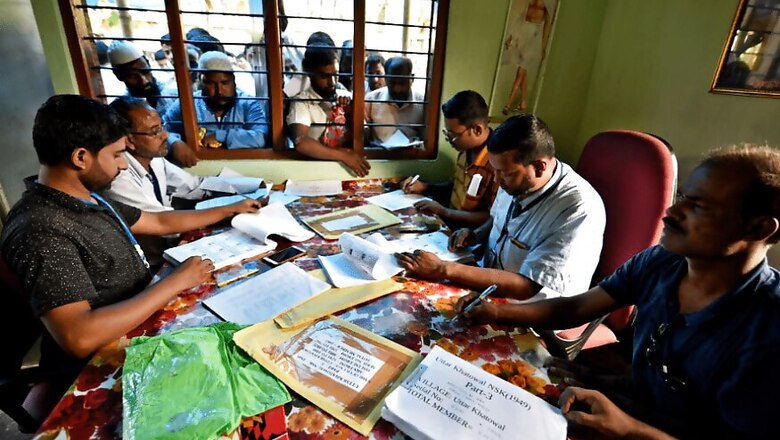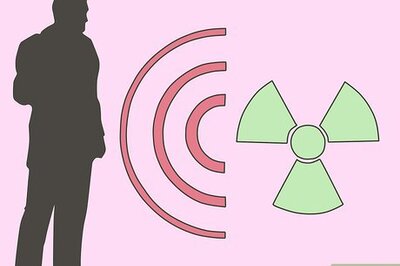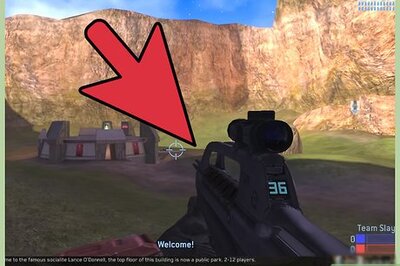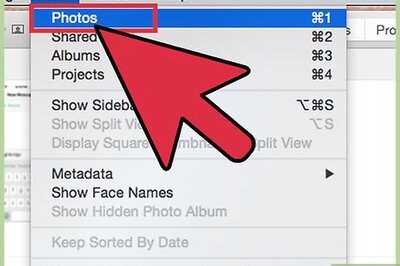
views
The BJP, its governments at the Centre and in the state, have often been credited with the process of updating the National Register of Citizens (NRC) in Assam. But various orders passed by the Supreme Court would suggest it was in fact the UPA-II at the Centre and the Congress government in Assam that propelled the NRC in the north-eastern state.
Also, the approval for money and other purposes was given to the Tarun Gogoi-government by a Competent Authority in the UPA that comprised then home minister Sushil Kumar Shinde and then finance minister P Chidambaram.
The orders passed by the Supreme Court since 2009 would also indicate that at no point the Congress governments opposed the updation of the NRC and showed commitment to comply with the mandate of the Citizenship Act, 1955, and Citizen (Registration of Citizens and Issue of National Identity Cards) Rules, 2003.
The court orders will also indicate that the Centre and the Assam government had told the Supreme Court that the NRC updation should complete by the end of 2016.
Again, Justice Ranjan Gogoi, who was sought to be dragged in the controversy for pushing the NRC in his home state, headed the bench in the top court for the first time in August 2014, by which time the processes of gazette notification, financial sanction, finalisation of modalities and timelines etc had already been done.
On a petition by NGO Assam Public Works for NRC upgradation in Assam, notices were issued to the state and the Centre in July 2009 by a bench headed by then CJI KG Balakrishnan.
In November 2010, the next CJI, SH Kapadia, issued rule nisi and expedited the hearing by asking parties to complete all pleadings in the next six weeks.
The matter was then heard effectively for the first time in 2013 by a bench headed by Justice HL Gokhale. This was the first time Justice Gogoi became a part of the NRC bench as per the roster decided by then CJI Altamas Kabir. Justice Gogoi, at this point in time, was not senior enough to lead a bench.
On April 3, 2013, the state of Assam, ruled by Congress, presented before this bench the blueprint of the steps to be taken for preparation of the NRC, and adduced a mechanism. The court, at this point, asked the central government — also ruled by Congress-led UPA-II — to indicate a time frame for completion of the process.
A week later, the Assam government told the Supreme Court that the state has “prepared a scheme, which is in tune with the Citizenship Act, 1955, and Citizen (Registration of Citizens and Issue of National Identity Cards) Rules, 2003,” and that this proposal has been forwarded to the central government.
The Election Commission, too, was on board with the NRC and submitted that electoral rolls for assembly constituencies of Assam of the year 1966 are available, which would be one of the basic documents for the basis of further steps to be decided to be taken. The court gave the central government three weeks to look at Assam’s proposal and revert.
On May 8, 2013, the top court took on record an affidavit by the MHA, led by Shinde, which submitted that three months were required to finalise the modalities for updation of the NRC.
Notably, the UPA government itself asked for three years to complete the entire process of updating NRC in Assam. The bench adjourned the matter for a while, also tagging a similar PIL by Assam Sanmilita Mahasangha.
On July 16, 2013, the court underscored that the extracts of National Register of Citizens of 1951 as well as the electoral rolls up to the midnight of March, 24, 1971, will have to be published and made available in all areas of the state for the Assam government’s modalities are to work out well. It once again asked the central government to indicate a concrete time frame.
But on August 2, 2013, the Centre yet again sought more time to finalise the modalities.
On August 23, 2013, the law officer for the central government produced a letter by Deputy Secretary to the Government of India, stating that the modalities for updating of NRC have been mutually agreed between the Assam and the Union of India.
The court then deferred the matter for four weeks while expecting the central government to grant the clearance for financial purposes as well as have gazette notification issued in this regard by the Registrar General of India.
On October 18, 2013, the bench was informed that the gazette notification will come only after financial sanction, which had also become contentious in view of the difference of Rs 59 crore between what the Assam government wanted and what the UPA was ready to allot. At this, the court asked the Joint Secretary (North East), Ministry of Home Affairs, to file his affidavit on these aspects.
On October 25, 2013, the Joint Secretary was personally present in the court to inform that all necessary steps in compliance have been taken by the HMA and IAS officer Prateek Hajela has been nominated as the NRC Coordinator. Financial approval by the Competent Authority, consisting of Shinde and Chidambaram, was also recorded by the court in its order.
Significantly, the bench, on this date of hearing, accepted the modalities finalised by the central government, and snubbed objections regarding the voters in D List. “As far as these persons are concerned, undoubtedly they are doubtful voters, and therefore their names cannot be included unless the NRC is updated and unless the Foreigners’ Tribunal declares them to be the Indian citizens,” the bench said in its order.
On February 3, 2014, the court was informed that a gazette notification has been published on December 6, 2013.
This notification also was completely in terms with Rule 4A (3) of the Citizenship (Registration of Citizens and Issue of National Identity Cards) Rules, 2003, and the enumeration shall be completed within a period of three years.
The bench expressed satisfaction at the steps taken and the proposed measures. It was in this hearing when Justice Gokhale, who was scheduled to retire on March 9 that year, said that the matter should next come up before a bench, of which Justice Gogoi is also a member, on August 4, 2014.
Subsequently, Justice Gogoi led the NRC bench in the top court and issued several directives, leading to publication of final draft of the NRC in Assam on July 30-31, 2019.
BJP came to power at the Centre in May 2014 and in Assam only in May 2016. By then, much water has already flowed under the bridge with the Congress regimes supporting NRC before the Supreme Court.
At no stage when the Congress was at the helm, either the state or the Centre raised objections in the apex court against the process of updating the NRC in Assam that was conducted using modalities what the Congress-UPA II jointly decided.
Thus, Congress’s opposition to NRC seems not completely in sync with a stand it took before the highest court of the land for five years while it had governments both at the Centre and in the state.
But then politics is more often than not just about convenience of making statements to attack your opponents sans facts and legal history.




















Comments
0 comment